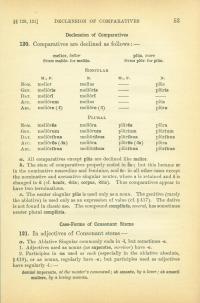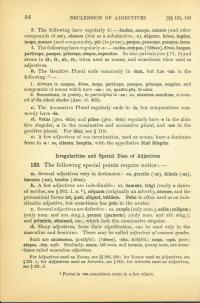121. In adjectives of Consonant stems—
a. The Ablative Singular commonly ends in -ī, but sometimes -e.
- Adjectives used as nouns (superstes survivor) have -e.
- Participles in -ns used as such (especially in the Ablative Absolute, § 419), or as nouns, regularly have -e; but participles used as adjectives have regularly -ī.
dominō imperante at the master's command
ab amante by a lover
ab amanti muliere by a loving woman - The following regularly have -ī.
āmēns, anceps, concord (and other compounds of cor), cōnsors (but as a substantive, -e), dēgener, hebes, ingēns, inops, memor (and compounds), pār (in prose), perpes, praeceps, praepes, teres
- The following regularly have -e.
caeles, combos, [† dēses], dīves, hospes, particeps, pauper, prīnceps, sōspes, superstes
So also patrials (see § 71.5) and stems in āt-, īt-, nt-, rt-, when used as nouns, and sometimes when used as adjectives.
b. The Genitive Plural ends commonly in -ium, but has -um in the following:1
- Always in combos, dīves, inops, particeps, praepes, prīnceps, supplex, and compounds of nouns which have -um (quadru-pēs, bi-color).
- Sometimes, in poetry, in participles in -ns: silentum concilium a council of the silent shades (Aen. 6.432).
c. The Accusative Plural regularly ends in -īs, but comparatives commonly have -ēs.
d. Vetus (gen. -ĕris) and pūbes (gen. -ĕris) regularly have -e in the ablative singular, -a in the nominative and accusative plural, and -um in the genitive plural. For ūber, see § 119.
e. A few adjectives of one termination, used as nouns, have a feminine form in -a (clienta, hospita) with the appellative Iūnō Sōspita.


